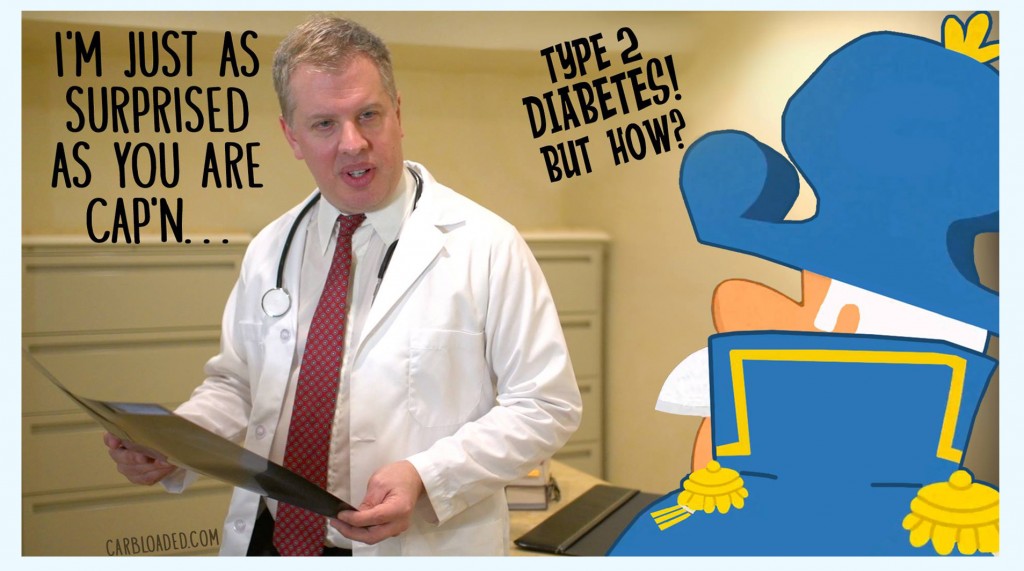 I got an interesting e-mail today from a gentleman that was able to reverse his diabetes, in large part, by changing his diet. It’s a story that I have heard many times over from people that decided to take control of their health and take positives steps to regain their health. The thing that struck me was a statement that I have read or heard more times then I can count. Here is what he said:
I got an interesting e-mail today from a gentleman that was able to reverse his diabetes, in large part, by changing his diet. It’s a story that I have heard many times over from people that decided to take control of their health and take positives steps to regain their health. The thing that struck me was a statement that I have read or heard more times then I can count. Here is what he said:
“…(the doctor) was pretty much speechless. I reminded him of our conversation about me reversing the disease, but I could see that professionally he could not comment. All he could say was that I looked thinner, and if he saw me on the street he would think that I was a runner and would not recognize me. So that was it! He sent me on my way, with a follow-up appointment to check my cholesterol in a couple of months. He lowered my diabetes pills to 850 from 2000 milligrams, took me off of my blood pressure medication, and all he could say was, “keep doing whatever it is that you’re doing.”
“keep doing WHATEVER it is you’re doing”
Every time I have heard that phrase from a doctor there is always a slight tinge of cynicism. Almost as if what the now-healthly patient did to recover their health was a seemingly unknowable series of steps. A mystery… magic. Certainly, a person of science has no interest in such hocus-pocus witchcraft.
Come on, are you kidding me? Wouldn’t you want your doctor to say “Stop the Presses, we need to get to the bottom of this so that more of my patients can take less medication!” Indeed, who is kidding whom? Sadly, less medication often means less revenue for the healthcare professional. Healthcare professionals have been trained that medication is the “hammer” they need to solve health problems. So whenever a patient walks in, they simply need to figure out what to hit. Sadly, sometimes the patient only has a sliver. Imagine if you hired a contractor to build your house and he only used one tool- a hammer. Welcome to the modern healthcare system.
It occurs to me that “keep doing WHATEVER it is you’re doing” is also the default advice many doctors are telling unhealthy patients (whether intentionally or not). Afterall, for example, they can simply give you medication to lower your blood sugar. Viola, problem solved. Now you can still eat all the horrible foods that got you where you are. Maybe as patients we like to hear a doctor tell us that we can keep doing “Whatever” we are doing.
This is a dangerous scenario for our health. The thing about doctors that are inclined to just prescribe medication, is that they train their patients into thinking that food choices are secondary.
Hypocrites is credited with the wise statement “Let food be thy medicine”. For many healthcare professionals, that is a cute, naive idea.
There are exceptions to this attitude. Some really great doctors and nurses out there are trying to use food to help people get to the root of the problem. For example, Dr. Peter Attia has joined up with author Gary Taubes (and many others) to attack this issue head on. They are doing serious research on nutrition and it’s role in our health. I should also mention Dr. Robert Lustig, who blew everyone away with his 2009 lecture Sugar: The Bitter Truth. The lecture went viral (the good kind) and helped lead to the formation of The institute for Responsible Nutrition
Hammers are for nails
Don’t get me wrong. I’m not an anti-doctor extremist. Nor am I anti-medication. We are imperfect creatures, and sometimes we require fixes that come from outside the nutritional spectrum. I do think, however, that those kinds of situations could be fewer if people viewed food as their first healthcare step. When we interviewed writer Mark Sisson for the film, he summed it up pretty well. He said “80% of your body composition is determined by how you eat…” The other 20% is effected by physical activity, sleep, sun exposure, etc.
The “Whatever” isn’t a mysterious random serious of unknown steps. Reduction of simple dietary sugar is a very specific, first step. Reduction or elimination of sweetened beverages is also a succinct and easily explained step. If people just did those two things, we would save billions of dollars annually and save countless lives.
So the next time you have a doctor tell you “keep doing WHATEVER it is you’re doing” ask him if that’s what he tells all of his patients.
Lathe Poland is one of the creators of the documentary film Carb-Loaded: A Culture Dying To Eat.


Speak Your Mind
You must be logged in to post a comment.